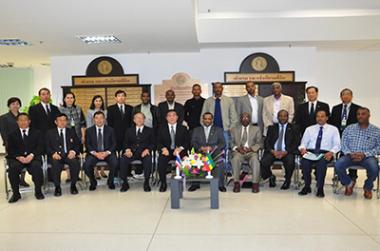Improving Land Administration in Ethiopia

Summary
To speed the transition from subsistence to commercial agriculture, Ethiopia recognized that it needed to reform its land administration. However, the country’s mechanisms for enforcing property rights, lowering transaction costs, and encouraging investment in land were weak. To build institutional capacity, Ethiopia requested World Bank help through analytical work and knowledge exchange facilitation. Ethiopia’s Ministry of Agriculture and World Bank staff identified Thailand and Vietnam as good sources of knowledge; both had successfully adopted dynamic policies in environments similar to Ethiopia’s. Using funding provided through the South-South Experience Exchange Facility, 11 high-level Ethiopian officials went on a two-week study tour to Vietnam and Thailand, where they learned about dynamic land-policy reforms, integration of urban and rural land registration systems, and laying the foundations for sustainable land administration.
The knowledge exchange helped the Ethiopian participants understand the need to integrate urban and rural registration systems and implement reforms in a transparent and participatory way. The delegates learned how to plan and prioritize reforms to develop the land administration gradually and sustainably. In Ethiopia, the structure of land ownership was fragmented: the participants acknowledged the need for a competent national surveying and mapping organization to record geodetic reference points and help with parcel identification and land registration to remedy this. They also saw the need to revise the legal and operational procedures to keep the sector dynamic. The Ethiopian officials learned about the importance of high level political commitment and engagement with the private sector, as well as successful land administration management, to ensure strategic guidance, good governance, and accountability.
Beneficiaries / Participants
Ethiopia aims to sustain its high economic growth and speed the transition from subsistence to commercial agriculture and toward increased industrialization and urbanization. The government realized it needs formal mechanisms to enforce property rights, lower transaction costs, and enhance gender equality to encourage land investment. To that end, Ethiopia initiated a series of law reforms to recognize customary rights, strengthen women’s property rights, and establish processes for creating and maintaining transparent and nondiscriminatory ownership documents. Building capacity to improve the land administration system is a crucial part of the government’s agenda and an integral element of Ethiopia’s Five-Year Growth and Transformation Plan (2011-2016). Along with passing several land laws since 2010, Ethiopia established a new Directorate of Land Administration and Use (DLAU) in the Ministry of Agriculture (MoA) and increased staffing at both the federal and regional levels. The World Bank has supported these efforts through analytical and advisory work, including a policy note on Land Administration delivered in 2011.
In a letter to the World Bank, Ethiopia expressed a desire to “capture lessons from different countries that are recognized for having made significant progress in the [agriculture] sector.” The Ministry of Agriculture asked to learn from Thailand and Vietnam for the successes and “contextual closeness they have to Ethiopia, which would make the adoption process simpler.” Land policy in both Thailand and Vietnam is dynamic, with established information systems providing effective service to customers. Using funding provided through the South-South Experience Exchange Facility, Bank staff connected Ethiopian officials to peers in the two countries to learn about reforming land administration as well as policy and legislation formulation processes, adjudication and demarcation, land consolidation, and cadastral methodologies for recording and maintaining data.

 China
China Colombia
Colombia Denmark
Denmark India
India Indonesia
Indonesia Mexico
Mexico Russian Federation
Russian Federation Spain
Spain United Kingdom
United Kingdom